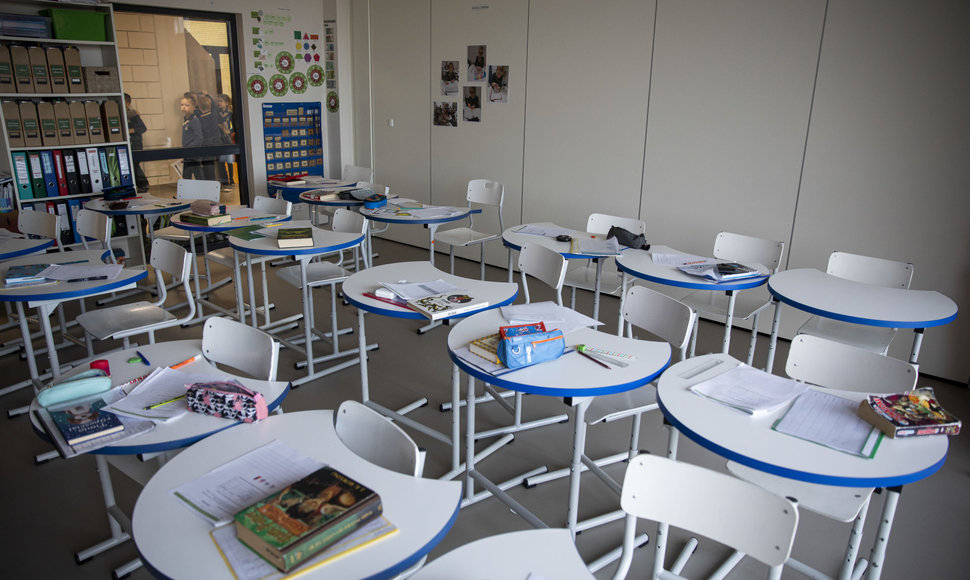According to data held by Lithuania’s Department of Statistics, the number of students attending general education schools in the capital’s region rose from 92,6 thousand pupils in 2014 to almost 97 thousand last year. Senior consultant for the real estate consulting company Solid Real Advisors Jonas Danilevičius says that this is also reflected by the rising shortage of buildings in the city, suitable for educational facilities.
“When a school is picking a building for its activities, location, a convenient commute, clean and safe environment are all important factors. Even the alignment of the building according to the cardinal directions, is important because that will dictate if there is enough natural light in the rooms. There must be enough fresh air, and an appropriate microclimate must be maintained. It is rather hard to find a combination where all of these things are present, where there is sufficient space outside and the owners create the opportunity for the school to exist long term,” the expert says.
His words are echoed by the director of the Gediminas City School, Simona Boguckienė, who says that a new school is unimaginable without comfortable spaces.
“Kids spend their entire day in school, which is why spaces that allow for rest, interactions, painting and other activities are one of the most important criteria when selecting a school. The spaces must be open, democratic and varied. Kids should be able to visit the lunchroom to grab an apple or have some water at any time. The common rooms should ensure both younger and older students have space,” she stated.
Essential to create a home atmosphere
J. Danilevičius notes that there is no shortage of various schools in Vilnius, but they all share certain features.
“Some schools decide to establish themselves in the city centre, others function more remotely, picking an area near a forest and conducting lessons outside. They differ by the age of pupils attending and by the emphasis they place on different academic disciplines. Nonetheless, all of them want institutions that are modern, safe, and which are attentive to the needs and abilities of the children. They want to achieve this by employing different methods and educational visions, which is why the criteria applied to buildings differs,” said the Solid Real Advisors senior consultant.
This is echoed by Laura Tekorė, the director of the Round Square School, located in Vilnius’ city centre. According to her, parents care not only about the school’s infrastructure but also how it will fulfil the guidelines of modern education.
“Nostalgia inducing blackboards can be found in every class. However, parents will inquire if next to it, there is a modern interactive board, if students get tablet PCs, learn to code. On the other hand, the education of pupils is not limited to class. The green spaces that surround the schools are important to both students that are playing and seniors that are resting,” the headteacher said regarding modern school infrastructure.
L. Tekorė also underscores that the opportunity to leave the classroom to learn from experience outside the school is also important. This is why finding a place in the city centre became a priority because it has many organisations offering education activities.
Experts agree that pupils spend a lot of time in schools, which is why their atmosphere has to remind of their home environment and offer comfort, safety and various activities.
Raising problems and prices of property
S. Boguckienė notes that the younger the pupils, the more relevant the location of facilities becomes. For example, when taking little ones to the kindergarten, it is essential the facilities are in a convenient location and that parents always have parking space when coming to see plays. This criterion is considered when selecting a school, but this also plays a role in other education needs. J. Danilevičius says that requirements for the location of the school often do not differ from criteria applied to pick a house.
“It is important for educational institutions to be situated in a clean and quiet environment, away from major traffic flows, manufacturing facilities, and sources of noise. In Vilnius this criterion is satisfied by Šnipiškės, Senamiestis, Užupis, Antakalnis, Žvėrynas and other central and nearby districts,” says the real estate expert.
Already this autumn a private education institution will open up in the Šnipiškės A. Juozapavičius street called Northern Lyceum, which was consulted by Solid Real Advisors during their search for appropriate premises. According to J. Danilevičius, there are prospects to establish schools in districts, which parents can easily and comfortably reach before or after work, often in areas where business or services centres are already established. Northern Lyceum will move to a building that belongs to the Lords LB Baltic Fund IV real estate mutual fund at Juozapavičius street. The school’s area will be more than 4000 square meters, and it will host 500 pupils.
On the other hand, schools can increase the price of existing and newly developed real estate projects.
“Newly developed blocks of flats are expanding the boundaries of the city, which are situated side by side with green zones. These are ideal conditions for education facilities. These can raise the price of homes, though this requires thoughtful planning and preparation of schools. Unless infrastructure is adjusted to emerging needs, traffic jams are likely during peak hour when parent drop of their kids. It is important to ensure that the safety of pupils is not compromised and all sides are satisfied,” the senior consultant at Solid Real Advisors warned.












